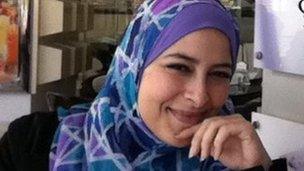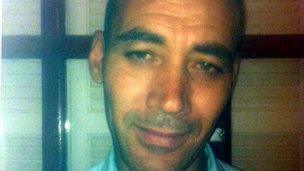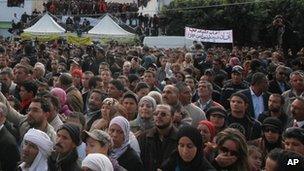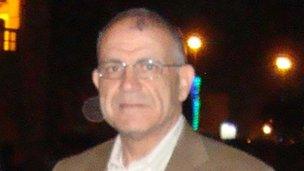Tunisia anniversary: Your experiences
- Published
Tunisia was the first country of the Arab Uprising to see a government fall and democratic elections take place.
A year after the overthrow of President Ben Ali what is life like and have conditions improved under the new government?
Here, BBC News website readers share their experiences of post-revolutionary life in Tunisia.
Nouha Tourki, French teacher, Susah

A year has passed since the events of last December and I think that all of us share and cherish the idea of being free and not afraid anymore.
It took us a long time to realise that this imposing dictatorship that stifled us for so long has really gone.
It's still strange to wake up in the morning and think that Tunisia is finally free. We're free to speak, free to talk about the forbidden taboos such as politics, free to choose our country's destiny, free to practice our religion in the right way.
We have voted for the first time in complete transparency and integrity. This is in itself a huge step for democracy in this country.
I am naturally very proud. The majority of Arab countries suffer from dictatorships and it is quite natural that at some point the people would explode under the pressure.
I hope that we have made a real step towards the path of democracy and we'll all work for the good of the country. We now have a golden opportunity to prove to the entire world that we are at the height of our revolution.
My biggest fear is social division. It is imperative that we remain united if we want to live in harmony and respect has to be the watchword.
It is also important that we move from a government dictatorship to government by the people.
We can be living proof of a state that, thanks above all to its human resources, will be rebuilt and reborn from the ashes.
Zouhaier Khelifa, businessman, Monastir

"I feel proud that a small country could inspire so many"
The greatest change for Tunisia has most definitely been freedom of speech and expression, whether through the media or in the street cafes.
The actions of Mohamed Bouazizi, the street vendor who immolated himself, were the catalyst. If not him though, I think another spark would have ignited a simmering tension.
The changes we have seen, particularly in the election, are a sign of the country's progress.
The way in which the people have steadfastly picked themselves up and resumed their daily lives after such a remarkable revolution is a testament to their resilience.
I feel proud that a small country could inspire so many. What an incredible year.
My hopes would be for a truly democratic secular country, with more prosperity and opportunity for all. I hope that the election will not be hijacked by extremist views from any area.
We began as an example to the world, let us continue in that mode. My fears would be that neighbouring countries will not have our stability and that may affect us.
Christine Thabet, retired teacher, Sousse
Mohamed Bouazizi's action was the last straw that broke the camel's back, but it could have been almost anything.

Tunisians gathered on Saturday to celebrate
Young people all over the country were getting to the end of their tether and were feeling the power of Facebook and Twitter. They had been calling for flash mobs and demonstrating briefly against the regime, posting video clips on Facebook. YouTube was censored at the time.
There have been changes in the attitude of many people as they try to come to terms with the meaning of democracy. Freedom of speech is a case in point.
Instead of simply expressing an opinion, many feel free to vilify and abuse people whose opinions do not please instead of simply arguing a different point of view.
Democracy to many means freedom of action without balancing rights and obligations. The many strikes we have suffered during the last months have taken place with no thought of their effect on the economic future of our country and with no thought of the right of others to get to work.
We now have an elected assembly, although its composition is not what I would have wished. We must, as a country, learn to compromise for the common good and that is not going to be an easy lesson to learn. In the long term I have faith in the pragmatism of the Tunisian people.
I was proud of the way the Tunisian people began the movement here and sad to see how the wish for freedom from tyranny turned out in other countries.
I was also proud of the way Tunisians, many of modest means, came to the aid of the refugees from Libya. Many of those Libyans are still in camps on the border.
I am unhappy with the lack of assistance received from developed countries with the refugees from countries which do not want their refugees back, or the refugees who cannot return home.
Apart from drafting a satisfactory constitution, our government has several immediate problems to deal with.
We cannot allow people to be bullied by extremists of any kind, so security forces must be given instructions which will allow them to deal with them with respect for the rule of law.
In the same way, unlawful strikes must be dealt with, otherwise we will lose even more investment to Morocco and Eastern Europe. Will our government be able to handle these problems firmly but justly?
It is vital that tourism picks up next year because of the number of people employed directly or indirectly because of tourism. I have to say that the drop in tourism has been caused by the often negative and alarmist reporting from many of the world's media, including at times the BBC.
The impact Tunisian events make on other countries depends on the way in which they are reported. Fair and balanced reporting must be a priority for the world's media in 2012.
Youssef Attig, Businessman, Tunis

"We feel pround of being the first to break the wall of fear against these mafia government"
The most important thing is the freedom of speech and the breaking of the wall of fear of any action against yourself, your family or business.
Except this nice feeling, things did not move on the right track. The economic situation has worsened, unemployment increased, the security decreased, nobody - like police or judges, wants to take action because they are afraid of being labelled as using old regime procedures.
With the religious extremist being very committed, engaged, and agressive, they are frightening everybody in the streets and at universities. So, no real action is taken and few parties condemn them publicly since they call them their brothers.
I sincerly think it is always progress even if the situation gets worse. In the longer run, we will be better off if we can project the image of modern country, democratic, with a lot of freedon of expression, credences and better equality and better justice.
We feel pround of being the first to break the wall of fear against these mafia government. Never forget that Carthage was the first democracy in the world.
I believe either Arab countries take action to introduce real reform or they will be wiped out. The most intelligent governemnt in the region is Sultan Qabous, who quickly took action, followed in my view by Morocco.
Algeria in my view, will try to find a negotiated solution because the people had their experience a few years ago without success. Monarchies will be next if Jordan fails to move to the right direction.
The fact is that when a goverment does not respond to the demands of the people, the people demand more.
Intissar Kherigi, trainee lawyer and human rights activist
This time last year, it seemed like things would never change - it was like watching an endless game of charades in which rulers got 99.9% in 'democratic' elections and the whole world looked the other way.
Now, people have hope that things can change; they can discuss, criticise, protest, set up associations, without having to be afraid.
For me, life has changed completely. I was finally able to go to Tunisia for the first time in 20 years and to meet my family, my grandmother, my cousins and get to know the country I was born in.
I used to wonder if I would ever be able to set foot in Tunisia and what it would feel like, but now it's only a short flight away. I have Mohamed Bouazizi and the revolution to thank for that.
I don't think Mohamed Bouazizi had any idea what enormous changes his act would trigger.
To say there's been progress doesn't begin to describe it. There has been an entire paradigm shift.
If you haven't lived in a dictatorship, it's impossible to understand what a change there has been. Under Ben Ali, people were afraid to talk to their neighbours - the saying "walls have ears" was no exaggeration.
You couldn't trust anybody, even your own family sometimes. What that does to you psychologically is hard to describe.
Today, many things still haven't changed; the economic situation is still bad, unemployment has gone up. But Tunisians now have something they never had - a belief in themselves and a way to create change.
They know that if any government tries to ignore or silence them, they can take to the streets again and exert pressure and create change - that is enormously powerful.
Never in a million years could anyone have predicted that the people of this small country could set off a political earthquake that has so far brought down four Arab leaders and shaken many more.
The revolution has set in motion a chain of events that I think will be very difficult to halt. What Tunisia did was to break the internal wall of fear in people's minds.
It gave people a new hope that things did not always have to be what they had always been and that change was possible.
Tunisia's now on a very new path full of risks and challenges. What I hope is that this year can lay the foundations for a new system of governing based on consensus, participation and respect for human rights.
Inas Ghaieb, English teacher, Tunis
I was fired from my job as an English teacher under the previous regime and thanks to the revolution I am now employed again. It's impossible to describe what a wonderful feeling it is.
Many people who suffered and lost their jobs because of government corruption have now been able to go back to work.
Of course things are not perfect and many people are still unemployed but the main thing is that we are now much more hopeful.
Many people have helped the country to change - not just Mohamed Bouazizi, but others too. I think our country was ready for a revolution and we just needed some action to start it.
Our former President Habib Bourguiba did much to improve the lot of Tunisians. The fruits of his efforts to better the education system are now being realised. Tunisians are well educated now and we should be grateful to him for all he did. We have jobs and livelihoods because of this man.
There is now freedom of speech in our country. I can be critical of political parties and have nothing to fear from policemen or soldiers. Everyone is entitled to his or her own opinion. For example I don't support Ennahda (the ruling party), but my brothers do.
I think Tunisians are much more prudent now. Although the interim government is fine for now, I fear Ennahda because I fear the rise of Islam. Many other Tunisians share this opinion.
I think it is important for us now to express our views, to be vigilant and not to surrender or give up on our revolution.